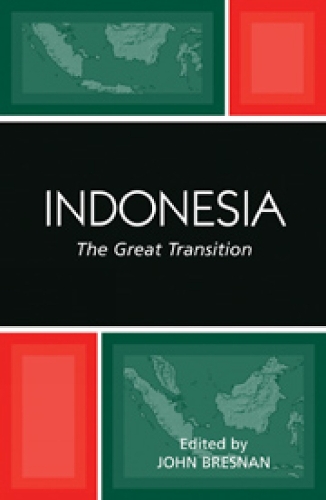
Indonesia: The Great Transition
(Paperback)
Publishing Details
Indonesia: The Great Transition
By (Author) John Bresnan
Contributions by John Bresnan
Contributions by Annette Clear
Contributions by Donald Emmerson
Contributions by Robert W. Hefner
Contributions by Ann Marie Murphy
Bloomsbury Publishing PLC
Rowman & Littlefield Publishers
6th October 2005
United States
Classifications
General
Non Fiction
959.8039
Physical Properties
Paperback
336
Width 188mm, Height 228mm, Spine 18mm
431g
Description
Indonesia is in the midst of an epic transition as it moves from decades of authoritarian government to a new era of democratic opening, from years of secular government to a time of struggle over the role of Islam in public life, and from the breakdown of a "miracle" economy to a search for resilience in the face of global forces. In this timely work, leading scholars analyze the causes of the social, political, and economic crises that erupted in Indonesia in the late 1990s, the responses of the elite and civil society, and the prospects for continuing reform. In the process, they explore such issues as the relevance of the nation-state in an age of globalization, the role of Islam in politics and violence, the strengths and weaknesses of a negotiated route to democratic governance, the relationship of corruption and structural reform to economic growth, and the prospects for stability in Southeast Asia. The first book to grapple with the scale and complexity of this historic transition, this work offers a clear and compelling introduction to the Indonesian experience for students with an interest in the problems of post-colonial states, to scholars in comparative Asian studies, and to anyone seeking a serious yet accessible introduction to the world's largest Islamic democracy.
A Study of the Weatherhead East Asian Institute, Columbia University
Reviews
More than a half century after its birth as an independent nation, Indonesia remains inchoate, unsettled, and difficult to define. Here, five leading specialists on the countrypolitical scientists, historians, economists, and anthropologistssum up its volatile history, its present prospects, and its probable futures with balance, insight, and precision. A landmark work. -- Clifford Geertz, Institute for Advanced Study
While academic in nature, the book effortlessly draws in readers by laying out an anomaly Indonesia is as a nation-state. The authors premise was to provide understanding to students of modern history, scholars on Asia, and anyone in the general public seeking an introduction to contemporary Indonesia. They have succeeded at all levels. * Far Eastern Economic Review *
Balanced and persuasive . . . Indonesia: The Great Transition does a splendid job of capturing the central dynamics at play in this fast-changing country and would make a valuable addition to courses on democratization, Asian politics, and Indonesia in particular. * H-Asia *
Without any doubt, this book adds to the growing number of academic works on Indonesian politics and it will be useful to both specailists and generalists who are keen to study the evolving political dynamics of post-Suharto Indonesia. * Contemporary Southeast Asia *
Post-crisis Indonesia is a different Indonesia, but how different is it and what does it mean for the future Explaining Indonesia requires an understanding of what has truly changed and what has not. These knowledgeable authors are ideally placed to assess the country's 'great transition.' -- Hadi Soesastro, Centre for Strategic and International Studies, Jakarta
Author Bio
John Bresnan (1927-2006) was a senior research scholar of the Weatherhead East Asian Institute, Columbia University.
